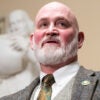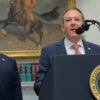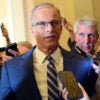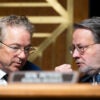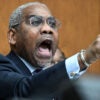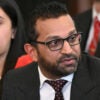Rick Perry is frustrated with political rhetoric that he sees as discriminatory toward Muslims, and says he “owes it to America” to share a different message.
“The message I want to get out is we are in a war with radical Islam—we are not in a war with all people of the Muslim faith by any sense of the imagination,” the former Texas governor told The Daily Signal in an exclusive interview.
“Muslims are our allies, and we need to preserve that and work with them,” Perry said. “It’s one of the real challenges of our time to be able to identify who our friends are, and certainly these are our friends.”
>>> The Muslim-Led Plan to Protect the Homeland
Perry, who dropped out of the Republican race for president in September, served 14 years as governor after two years as lieutenant governor to George W. Bush. He is the longest-serving governor in Texas history, and led a state with one of the largest Muslim populations in America—much of it in and around Houston.
It’s a population Perry says he knows well. He spoke to The Daily Signal from a 60-acre “rural compound” outside Round Top, Texas, that he shares with two college buddies and lots of barking dogs. In a 45-minute phone conversation, the former governor frequently—and unprompted—named friends who happen to be Muslim.
“I know the Muslim community better than any other community,” Perry said, adding:
My story is one of a relationship with individuals in the Muslim community who have been extremely patriotic, powerful, economic drivers in this state, and it’s broadened to international leaders like His Highness the Aga Kahn [Prince Shah Karim Al Hussaini, spiritual leader of the Shiite Ismaili Muslim community] and the king of Jordan, Abdullah [King Abdullah II], who I would suggest is one of our better partners in the war against terror.
This week, The Daily Signal profiled Muslims in Houston who consider themselves part of the fight against extremism.
Perry, an evangelical Christian, says his fondness for Muslims was inspired by his time as a pilot in the U.S. Air Force. He was deployed to Saudi Arabia in 1975, when he was 25.
The former governor says he came to appreciate America, and the opportunities it provides, when he visited the coastal city of Dhahran and witnessed human rights abuses and government oppression.
“I had the opportunity as a young boy who hadn’t been out of Texas to be exposed to a lot of different religions, cultures, and geography,” Perry, 66, said. “I saw things that helped create in my mind the vision of how people lived there, and the form of government under which the people lived. I became really enlightened about what an extraordinary country America is, and the freedoms we have.”
In Texas, Perry’s relationship with Ismailis, a denomination within the Shiite sect with about 30,000 to 40,000 followers in his state, has been especially warm.
He laid the first brick at the groundbreaking ceremony for an Ismaili worship center in Plano in 2005, he recalls.
In 2008, he helped expand the Muslim Histories and Cultures Project, a teacher-training program led by Texas Ismailis that focuses on introducing Islamic history and culture in schools.
>>> How These Texas Muslims Help Lead the Fight Against Terror
As governor, he signed into law a bill requiring food products sold in stores to be correctly labeled as halal, or permitted for Muslims to eat.
One prominent Muslim leader in Texas, Sada Cumber, expresses appreciation for Perry’s efforts.
Cumber, 64, is a Houston resident and Pakistani-born Ismaili Muslim who served as the first U.S. ambassador to the Organization of Islamic Cooperation Conference. Appointed by President George W. Bush in 2008, Cumber was tasked with traveling the Muslim world and seeking “mutual understanding and dialogue” on foreign policy issues.

Sada Cumber, first U.S. ambassador to the Organization of Islamic Cooperation Conference, commends former Texas Gov. Rick Perry for his outreach to Muslims. (Photo: Scott Dalton for The Daily Signal)
In 2014, Perry appointed Cumber to the Texas Higher Education Coordinating Board.
“During his tenure as governor, Rick Perry built an extraordinary relationship with the Muslim community in Texas,” Cumber told The Daily Signal, adding:
He recognized that Muslim Texans are hardworking, loyal citizens contributing to the state on civic, social, and economic levels. I think he was especially cognizant of Muslim Texans’ role in entrepreneurship, high-technology, and other growth-driving activities. Perry was, and is, very aware and appreciative of the Ismaili community, its moderate and progressive values, and its emphasis on quality of life.
In the interview, Perry sought to draw a distinction between how Muslims are welcomed in America as opposed to Europe, where many Muslims are not as integrated.
Smart policy dictates engaging Muslims in the fight against Islamist terrorism, he said, not surveilling them:
The idea that there are definable Muslim communities in this country is false. We don’t have Muslim neighborhoods. They don’t exist—because they are our neighbors. America is strong because we are a mosaic of a lot of different people, philosophies, and culture. And we believe in freedom of religion. We believe that if people are left to their freedoms, and free to use all of those constitutional liberties we are given, that this will be a stronger and better country.
While acknowledging the seriousness of the fight against the Islamic State, or ISIS, and other terrorist groups, Perry is quick to recognize that most victims of Islamist terrorism are themselves Muslims. He says U.S. politicians should be focused on who the true enemy is.
“I think we have to be careful of falling into a trap,” Perry told The Daily Signal, explaining:
There have always been people that used differences—in skin color, religion, and culture—to divide us. America has always been able to overcome that. So it’s up to people like me to share the reality that I have had with the Muslim community. And what I am saying is that my engagement with them as a statewide elected official in Texas for better than 16 years has been one of a very positive relationship with a patriotic, hardworking people.

